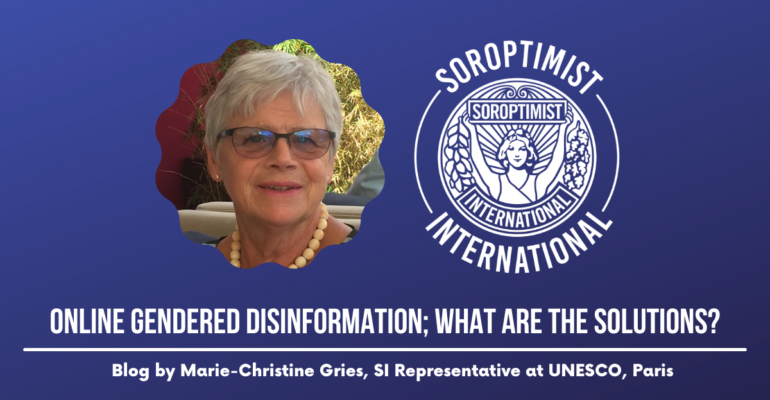Blog by Marie-Christine Gries, SI UN Representative at UNESCO, Paris
For the International Day of Women in Multilateralism, celebrated on 25 January 2023 , UNESCO has launched a global dialogue on the governance of social media content to counter gendered disinformation, hate speech, and harassment online.
Alarming and empowering the leaders of internet companies and engaging the political authorities to regulate, promoting the fight against this international scourge is essential in the strategy for achieving gender equality. The phenomenon of online aggression has today become the first weapon of gendered censorship around the world. No country is spared by the power of digital tools used for social networks, whilst women journalists, artists, human rights defenders are the most targeted. A recent study on journalists shows that 73% of those interviewed have suffered these online assaults in their work; whereas in real life, these threats have materialised for one in five of them. These persistent attacks, this harassment, have consequences on their behavior: 30% said they self-censor on social networks and 20% that they withdrew from online interactions because of the harassment and threats suffered. There are cases of suicides.
This disinformation does not only threaten gender equality, it also affects the diversity of public debates, freedom of expression and human rights.

The objective of the multilateral global debate launched on 25 January is to hear the testimonies of those attacked and experts, to involve all actors in the sector and political decision-makers to achieve the establishment of universal principles for regulating digital platforms. The results of the works will then be examined at the UNESCO Conference “Internet for Trust”. They will also contribute to the global reflection of the United Nations on the future of multilateralism to ensure the participation of women in the creation of a new multilateral system and of a Global Digital Compact. The approach is also part of the framework of the first UNESCO Recommendation on the Ethics of Artificial Intelligence adopted in 2021 by the Member States.
During the discussions between the participants of the panels of this day (experts, professional women witnesses, from various regions of the world) several crucial questions were highlighted:
>>> The high technical level of digital technology allows attacks to spread very quickly, ricocheting from one platform to another. Blocking the spread of disinformation is increasingly random. The research panelists mentioned the unwelcome reception of the companies responsible for the platforms to allow them to work on solutions against abuse. There are indeed network moderators (not everywhere) and tools, still imperfect, to detect abuse. However, algorithms are not very effective on gender issues (let’s remind that there are only 5% of women among programming specialists).
>>> The market law drives the governance of platforms. The financial value of the platforms is calculated in the number of “followers”. The lucrative strategy obviously encourages to open the networks without limits or censorship and to favour what develops the popularity of the platform.
>>> The extreme violence of the attacks, the excess of vocabulary and sexist allusions are about to be trivialised. A majority of people following judge them as dubious jokes, without awareness of their character of systematic and persistent harassment intended to oust “visible” women from networks and public life.
>>> The laxity of the platforms is favoured by the current absence of a precise definition of disinformation. Few regulations exist, despite the general ethical principles. Victims’ complaints to networks or to the justice rarely succeed and too late.

There is a real difficulty in reconciling regulation with freedom of expression and there is no shortage of examples of regulatory provisions misused in political censorship. The balance between regulation against disinformation and censorship promises to be difficult to find.
What future? An obvious fact that the panelists did not fail to mention: Education! Educate the users of the networks by developing their critical thinking, educate the police so that they measure the danger of the threats denounced by the victims, and overall, educate young people, and especially boys to eliminate gender bias.
Closing the Conference, the panelists wanted to be optimistic. The launch of the multistakeholder reflection allows it. This is one of the issues among many others that could reduce the time needed to establish gender equality, currently evaluated at 100 years as cited by the Director-General of UNESCO, Ms. Azoulay, opening of the Conference.
To read more about the International Day of Women in Multilateralism, visit the UNESCO webpage for this event.

